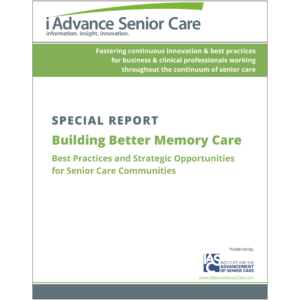Report suggests ways to increase cognitive assessments during Medicare annual wellness visits
The odds of your residents undergoing a cognitive assessment as part of a Medicare annual wellness visit (AWV) may increase given a new report from the Gerontological Society of America’s (GSA’s) Workgroup on Cognitive Impairment Detection and Earlier Diagnosis.
The Affordable Care Act established the AWV to enable Medicare beneficiaries to receive preventive and assessment services during visits with their primary care providers (PCPs). Detection of cognitive impairment is among the required AWV services, but no specific tools are mandated and no data are available regarding tools used for this purpose, according to the GSA. The new report outlines a four-step process to address that issue:
1. Kickstart the cognition conversation. To increase detection of cognitive impairment and promote earlier diagnosis of dementia in Medicare beneficiaries, the GSA workgroup endorses that PCPs use the AWV as an annual opportunity to initiate and continue a conversation with beneficiaries and their families about memory-related signs and symptoms that could develop in older adulthood.
2. Assess the patient whether he or she is symptomatic. The GSA workgroup endorses use of a cognitive impairment detection tool from a menu of tools having the following properties (the report provides a list of tools that may be suitable for this purpose):
- It can be administered in five minutes or less;
- It is widely available free of charge;
- It is designed to assess age-related cognitive impairment;
- It assesses at least memory and one other cognitive domain;
- It is validated in primary care or community-based samples in the United States;
- It is easily administered by medical staff members who are not physicians; and
- It is relatively free from educational, language and/or cultural bias.
3. Evaluate with full diagnostic workup if cognitive impairment is detected. The GSA workgroup recommends that all Medicare beneficiaries who exceed threshold scores for cognitive impairment based on the cognitive assessment tools used in step 2 undergo a full diagnostic evaluation. Numerous published clinical practice guidelines are available to primary care providers and specialists to help them arrive at a differential diagnosis.
4. Refer to community resources and clinical trials, depending on the diagnosis. The GSA workgroup recommends that all Medicare beneficiaries who are determined to have a diagnosis of Alzheimer’s disease or related dementia be referred to all appropriate and available community services to learn more about the disease process and how to prepare for the future with a dementia diagnosis.
“The GSA workgroup views this suggested four-step process as a framework for communicating with a wide variety of stakeholders about the critical importance of incorporating cognitive impairment detection into everyday clinical practice with older adults,” Richard Fortinsky, PhD, chairman of the workgroup, said in a statement. “We look forward to building on this report by helping to plan additional activities intended to disseminate and implement the report’s recommendations in communities throughout the country.”
I Advance Senior Care is the industry-leading source for practical, in-depth, business-building, and resident care information for owners, executives, administrators, and directors of nursing at assisted living communities, skilled nursing facilities, post-acute facilities, and continuing care retirement communities. The I Advance Senior Care editorial team and industry experts provide market analysis, strategic direction, policy commentary, clinical best-practices, business management, and technology breakthroughs.
I Advance Senior Care is part of the Institute for the Advancement of Senior Care and published by Plain-English Health Care.
Related Articles
Topics: Alzheimer's/Dementia











